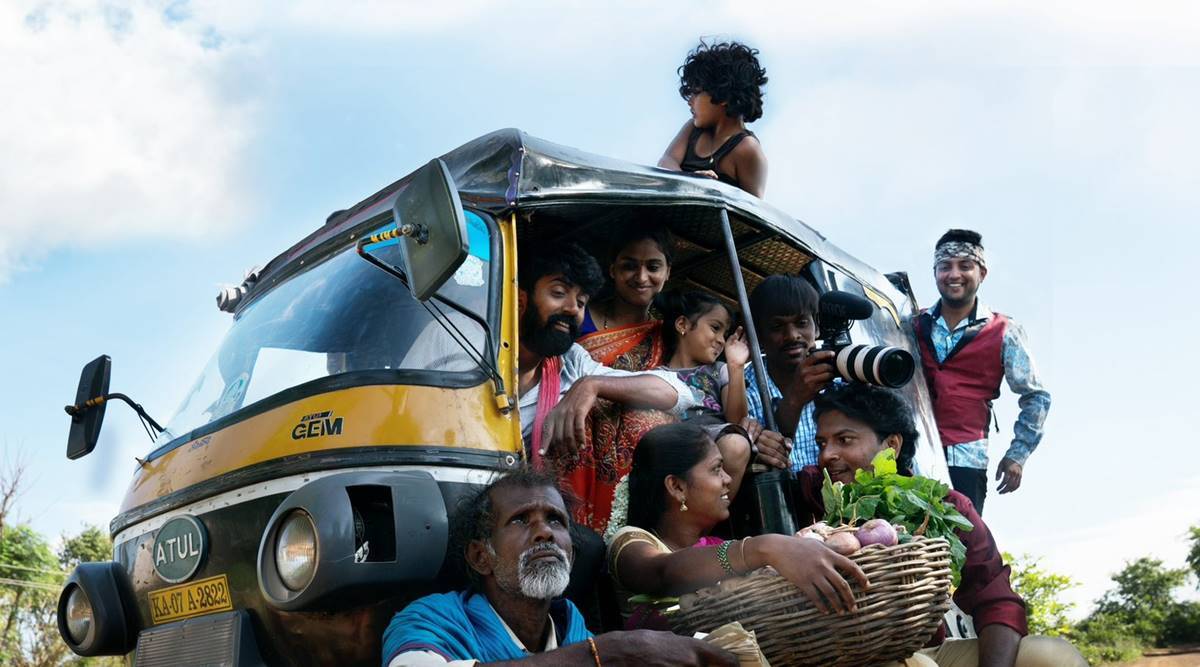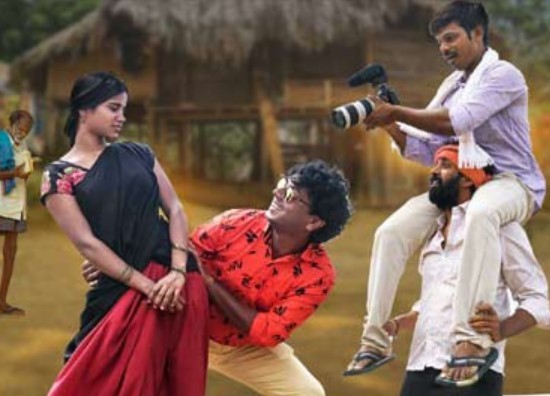Cinema Bandi Review in one sentence, a movie full of life, comedy and a joy to watch with the family. Set in a Rayalaseema village a place that has a sizeable film buffs, from the guy who watches Mahesh Babu films in theatres five times, to the man who wants a haircut like Ram Charan or Allu Arjun.
The story crafted by Raj & DK revolves around a bunch of people from the village set out to make their own film, they inevitably derive from standard Tollywood tropes and aesthetics, but there’s no fascination bordering on reverence for the world of movies.
An optimistic yet struggling auto driver’s takes an interesting turn when he finds a piece of high-end camera in his vehicle. He gathers his fellow villagers and decides to make a film. The film showcases how a motley group of villagers with zero experience of filmmaking attempt to make a film.
Everyone is a filmmaker at heart and anyone can make a film if they put their will to it, the makers of Cinema Bandi try to tell us. One look at the characters living in Gollapally village, where the film is based, and the last thing you’d expect is for them to make a film. And yet, a motley bunch of villagers gather around and try make a film against all odds.
Sharing the poster of Cinema Bandi, the Samantha Akkineni wrote, “#cinemabandi is endearing and so full of hope. Three cheers to the team for bringing us this gem of a film….a breath of fresh air. Congratulations @rajanddk so so happy for you. Now, let’s release #thefamilyman2 (sic).”
Cinema Bandi is a comedy-drama featuring many new talents. The film, which is set in the Andhra Pradesh-Karnataka border, revolves around a group of young filmmakers who try to make a film with the camera they found. The film premiered on Netflix on May 14.
Moving on the bunch of people whom the movie is centered soon get hold of an expensive camera — which they trusted is similar to the ones used for Mahesh Babu and Pawan Kalyan’s movies — they are convinced that making a film would be a breeze.
They never doubt if they would find good writers or actors around them. They don’t doubt their own abilities in directing the movie. Cinema Bandi is a hopeful, delightful ode to the joys and possibilities of democratising filmmaking. Because, as the film’s tagline says, ‘Everyone’s a filmmaker at heart’.
Cinema Bandi is totally fun, a joy to watch for everyone

Veera (Vikas Vasishta) is an auto driver from Gollapalli village in Anantapur district, near the Andhra-Karnataka border. When a passenger leaves behind an expensive camera in his auto, he is inspired by smaller Telugu movies like Agent Sai Srinivasa Athreya doing commercially well in recent years, to make a movie which would bring in a lot of money. He pulls in his photographer friend Gana (Sandeep Varanasi), and the underprepared duo figure things out as they go.
Cinema Bandi heavily draws from Faiza Ahmad Khan’s 2008 documentary Supermen of Malegaon, on the film industry of Malegaon making locally contextualised versions of popular Bollywood and Hollywood films while creatively overcoming the lack of resources. Veera and Gana find their actors in the local school, hair salon, vegetable market and the agricultural fields. Tracking shots and crane shots are managed with Veera’s auto and a bullock cart.
Like the Malegaon filmmakers, Veera and Gana too start off by mimicking Tollywood, even recreating the Titanic pose which is Gana’s unimaginative favourite as a photographer. But with the participation of the entire village, the film starts to become a unique, local cultural product of the region, with all the ingenuity and quirks of its people.
For example, while shooting a scene where the heroine is attacked by the bad guys, the woman playing the heroine instinctively bashes them up, forgetting that she is in a Telugu movie and therefore needs to look scared while waiting for the hero to jump in. From the people, landscape, choreography, costumes, language and everything else, Veera and Gana’s film develops its own voice.
Cinema Bandi itself has this quality, in its beautiful depiction of a Rayalaseema village, which is usually limited to being a backdrop for faction films in Tollywood. The dialect, which is very rare in Telugu movies, is not limited to a quirky, comical element. It is a charming yet essential feature.
The scene where Veera and Gana try to pick their heroine, identifying them by their class 10 ranks on a poster, is a painfully funny marker of Telugu culture. The characters have concerns like drought and unavoidable migration to nearby cities, which are universal but also pertinent to the region.
Though the film has an urban outsider’s gaze, it manages to avoid being patronising. Characters like Maridayya (Rag Mayur), and especially Manga (Uma YG), are well-rounded and not limited to their rural quirks. But it also glosses over the inequalities between the better-off, urban woman who owns the camera (Sindhu Sreenivasa Murthy) and the people of Gollapalli. The camera is shown as some sort of equaliser, where each side watches footage of the other and empathises with them.
While Veera’s film slowly grows into a collective creative pursuit for most of the village, it begins as a business venture for him. He wants the money to pay off his loans, to bring better roads and electricity to his village. We are told that most people in his social circle own land, but farming has become unviable. Yet Veera and the others eagerly wait for the rain, not for their farmland but to shoot a rain dance sequence in their film.
The actors in Veera’s film have to manage their day jobs too, selling vegetables or giving haircuts. Veera starts off thinking the fancy camera is all he needs, but there are unanticipated expenses. Some people around them might pitch in occasionally but would need to be paid their daily wage if they have to miss work. Making a film is serious work, as Manga reminds people who mock their efforts.
We know from the start that Veera’s dreams of making crores with just a camera are not realistic. But even with access to cheaper technology and platforms like YouTube which are seen as more egalitarian than mainstream film industries, barriers to access and financial constraints remain. Cinema Bandi lovingly, passionately propounds the idea that every individual and community can tell imaginative stories through film, or any medium for that matter. But it is left to the audience to imagine a world with alternative economies which would make this possible.
It is worth watching the movie.

